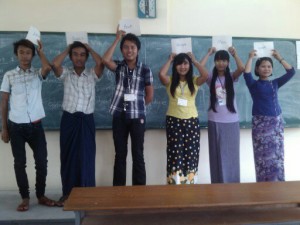Written by Dr Khin Thinn Thinn U
Assistant Lecture – Department of Law, Pyay University, Myanmar
On the 17th of June 2014, I was very excited to present a paper, in Research Paper Reading Session 6/2014, at Pyay University, Myanmar. My Professor encouraged me to present about Clinical Legal Education. I thought that this was a great opportunity to share my experience and knowledge of CLE because, the Rector, the Pro-Rector, Professors, Associate Professors, teachers and students of my University may attend this paper reading session. So, after brainstorming, I chose the topic of the paper.
First, I compared traditional teaching methods with CLE methods. Traditional teaching methods employ 100% teacher dominant lecture approach that teaches theory, only, to students. Traditional teaching methods do not monitor student lesson retention. Students sometimes lose interest, cannot understand the essence of a lesson or know how to apply a lesson to the law, as a matter of practice.
Before 2013, I had only a little knowledge about did not know the effectiveness of, or the uses for CLE. After I attended the Myanmar National CLE Workshop, in Mandalay, the CLE Conference, in Thailand, and the Myanmar National CLE Summer School Training Workshop, in Taunggyi, I really understood the usefulness of CLE methods, and the excellent purposes of CLE Clinics that deliver legal services to poor, vulnerable and marginalized people. I was so energized to implement CLE teaching methods, in our university, that as soon as I came back from the Taunggyi CLE Workshop, I participated in a training workshop-for-trainers, in my department, for 5 days, which was under the supervision of my professor. Since the beginning of this semester, some of my colleagues and I have taught students, by using CLE methods. I found that students think more deeply, study lessons without boredom, solve problems creatively and enjoy classes more. By comparing traditional method to CLE methods, I found that CLE methods were the most effective for teaching students. Based upon my own experience, I chose “Effective Teaching Methods of Legal Education”, as my topic.
In the paper reading session, I presented about traditional legal education, in comparison to the benefits of CLE, legal clinics and their combined impact on future legal education. The purpose of my presentation was to explain the role of CLE programmes, and to develop clinical legal education in Myanmar. Effective teaching methods and the opening of legal clinics, in Myanmar, greatly benefit society, as a whole.
Clinical legal education educates future lawyers, enables students to enter job markets and promotes legal ethic. Later, I showed the benefits, to our country, from the use of interactive teaching methods, in traditional university legal education. Law students can get practical skills, sometimes called lawyering skills, which include: legal analysis, reasoning, and research; factual investigation; communication; counseling; negotiation; litigation; alternative dispute resolution procedures; the organization and management of legal work; and the recognition and resolution of ethical problems. In this way, students gain ethical and moral development.
From the perspective of Myanmar Universities, CLE builds bridges between law schools, civil society, government, non-governmental organizations and communities that would otherwise not have access to legal assistance. From the perspective of legal education, legal education may become more advanced, and may benefit the academic study of Law. The Board of Study should change the current curriculum and syllabus to incorporate CLE methodsand from the perspective of our country, the level of legal education could be higher, so that students can enter the legal profession, with the best possible instruction, information, guidance, experience and opportunity. They can then promote the rule of law and access to justice in the whole country.
By using interactive teaching methods in the class, students will get a better understanding of the law, legal cases, court procedures, and attorney and judicial ethics. By using the models of CLE, in university, students can be provided with the hands-on experience of working with real cases and real clients, school and can be provided with hands-on experienceand can gain many skills, such as: critical thinking; communication; interviewing; counseling; and problem-solving. Universities can help the community, by giving free legal advice, though their students.
All of the teachers and students were very interested in my power point presentation, which included images of CLE activities and teaching methods. At the end of my presentation, a professor commented that this is a good teaching method, which can be used in the Department of Myanmar. Another professor also told me that I did well, and my professor felt so proud of her department.
I now feel stronger about participating in many future programmes, such as Community Teachings and the upcoming National Mock Trial Competition, in February. I also want to find other ways to develop CLE, in Myanmar. Thanks to all of my teachers, trainers and everyone who helped me and this programme.

This is a role play about negotiations, between an insurance company and a prospective assured, who wants to buy a marine insurance policy. The insurance salesman is explaining the rights and duties of an assured.

This is the energizing session.

This picture shows the Mock Trial practice in Trainers’ Training Workshop.

